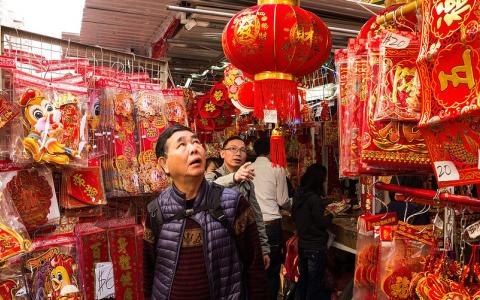
(CNN) China's economy is slumping and the country is still suffering the effects of the trade war with America. An outbreak of a new and deadly virus is the last thing it needs.
The Wuhan coronavirus — which has killed 17 people and infected nearly 600 so far — has already roiled Chinese markets and thrown plans for the upcoming Lunar New Year holiday into chaos for millions of people.
If Beijing fails to contain the disease quickly, it will cause more pain for a country that was already trying to stave off a serious downturn by trying to encourage more consumer spending. An epidemic could have the opposite effect.
"If you're trying to rebalance the Chinese economy, this is one of the last events you want to see," said Logan Wright, director of China markets research at Rhodium Group.
The world's second biggest economy grew at its slowest pace in nearly three decades last year as it contended with rising debt, cooling domestic demand and US tariffs, many of which remain in place despite a recent truce. Beijing is worried about unemployment, too, and has announced a wave of stimulus measures in recent weeks aimed at preventing mass layoffs.
Most of the tariffs Washington imposed on billions of dollars worth of Chinese goods haven't gone away, said ING economist Robert Carnell, adding that Beijing has already nudged "every policy lever that could be nudged" to try to offset the effects of the trade dispute.
The Chinese economy is just "managing" right now, he said.
Wright called the timing of the outbreak "especially unfortunate" given the Lunar New Year holiday. The period is the largest annual human migration on Earth, during which hundreds of millions of Chinese travelers usually cram themselves into homebound trains, buses and planes for family reunions.
The spread of the virus prompted Chinese officials to take the largely unprecedented step of partially locking down Wuhan, a city of 11 million people in central China where the virus originated. Airline regulators have also instructed Chinese carriers to offer free cancellations on flights into Wuhan, while state media has reported that China's rail authorities are taking similar steps.
A SARS-like scenario
China has a good sense of the economic trouble that could lie ahead.
The 2003 SARS outbreak, which sickened 8,098 and killed 774 people in 37 different countries, cost the world economy $40 billion, according to a study from the National Institutes of Health. The economies of China and Hong Kong bore the brunt of that burden, the authors said.
Like SARS, the Wuhan coronavirus outbreak could spark widespread fear and spur people to hunker down and avoid going outside. That kind of behavior would deal a huge blow to the service sector, which now accounts for about 52% of the Chinese economy.
"As soon as you're worried, you're worried," Carnell said. "You stay home, if you can. You don't go out to the local food court, you try not to travel on public transport, you try to work from home, you don't travel for pleasure. You don't get on a plane, you don't go to the movie theater, restaurants or conferences."
The SARS outbreak forced the cancellation of the week-long May Day holiday in China, forced the postponement or abandonment of sporting, business and cultural events and turned Beijing into a virtual ghost town.
Investors are already worried about what the Wuhan virus could mean for China's growing travel industry. Shares of the country's three major airlines — Air China, China Southern and China Eastern — all closed down 2.5% or more in Shanghai and Hong Kong on Thursday. And the aviation sector is "likely to remain under pressure as confirmed cases are set to increase," said Andrew Lee, equity analyst at Jefferies.
SARS also had a wider impact on the economy. China's annual growth rate slumped to 9.1% in the second quarter of 2003, down from 11.1% in the first quarter of that year, according to brokerage firm Macquarie Group.
This time around, the hit to China's GDP could be even worse, because the sectors most directly affected now make up a bigger part of the economy, Commerzbank analyst Hao Zhou and economist Marco Wagner wrote in a research note on Wednesday. For example, tourism accounts for about 5% of China's GDP today, compared to 2% in 2003.
"If history is a guide, there is clearly a risk that the already struggling China's consumption would face further headwinds if the (Wuhan) virus can't be effectively controlled," Hao and Wagner wrote.
Limiting the economic blow
But China is stepping up efforts to contain the virus, including the partial lockdown of Wuhan, and some lessons have been learned since 2003, when the authorities were slow to release information and initially downplayed the severity of the SARS outbreak.
"Rumors and bad information were drowning out good information at that time, and people were especially careful as a result," said Wright, adding that he expected the economic impact of the Wuhan virus won't be as severe as during the SARS crisis.
And as scary as the 2003 outbreak was, experts say the impact on China's economy was short-lived.
Once SARS faded away, China's growth rebounded quickly and climbed to 10% in the third quarter of 2003, according to Commerzbank's Hao and Wagner.
Some remain skeptical about how forthcoming Beijing is being about the outbreak. A senior US State Department official, for example, said Wednesday that the United States is concerned about transparency inside the Chinese government about the Wuhan coronovirus. But the official added that Washington has seen encouraging signs that Beijing understands the gravity of the problem.



